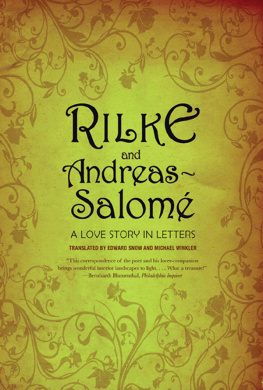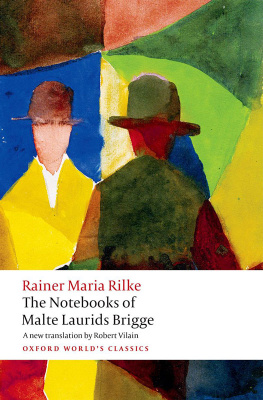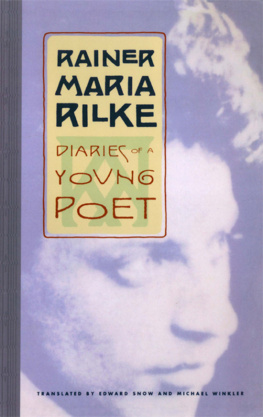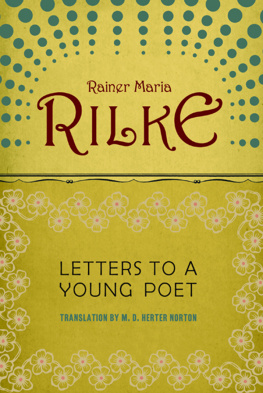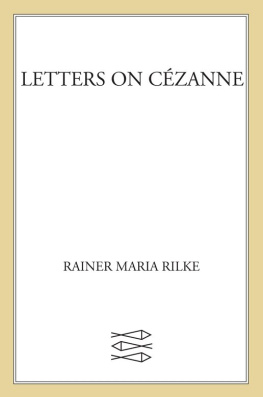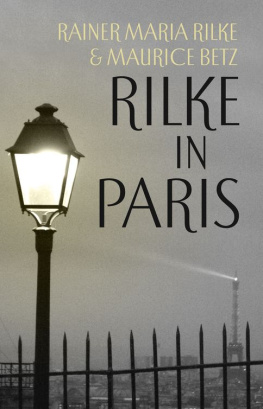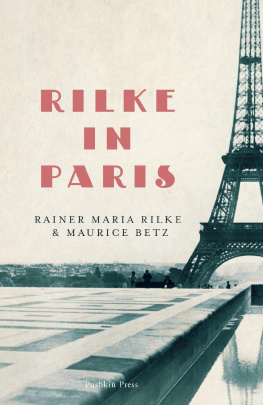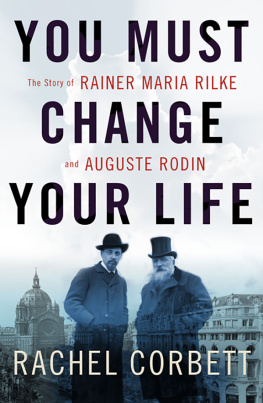

Rainer Maria Rilke
TRANSLATED BY EDWARD SNOW AND MICHAEL WINKLER
Diaries of a Young Poet
IN TRANSLATIONS BY M. D. HERTER NORTON
Letters to a Young Poet
Sonnets to Orpheus
Wartime Letters of Rainer Maria Rilke
Translations from the Poetry of Rainer Maria Rilke
The Lay of the Love and Death of Cornet Christopher Rilke
The Notebooks of Malte Laurids Brigge
Stories of God
Letters of Rainer Maria Rilke. Volume One, 18921910,
Letters of Rainer Maria Rilke. Volume Two, 19101926,
translated by Jane Bannard Greene and M. D. Herter Norton
Duino Elegies, translated by David Young
IN VARIOUS TRANSLATIONS
Rilke on Love and Other Difficulties. Translations and Considerations of Rainer Maria Rilke, compiled by John J. L. Mood

Lou Andreas-Salom
You Alone Are Real to Me: Remembering Rainer Maria Rilke,
translated by Angela von der Lippe
Nietzsche, translated and edited by Siegfried Mandel
Looking Back, translated by Breon Mitchell
The Freud Journal, translated by Stanley A. Leavy
[RMR to LAS in Munich, sent by messenger]
[Letterhead:]
Ren Maria Rilke
Munich, Bltenstrasse 8/1
May 13, 1897
Most gracious lady,
Yesterday was not the first twilight hour I have spent with you. There is another in my memory, one that made me want to look into your eyes. It was winter, and all the thoughts and aspirations that the spring wind scatters into a thousand faraway places were crowded into my narrow study and my quiet work. Then suddenly a gift arrived from Dr. Conrad: the April 1896 issue of Neue Deutsche Rundschau. A letter from Conrad referred me to an essay in it titled Jesus the Jew. Why? Dr. Conrad had recently read a few sections of my Visions of Christ (five will soon appear in his journal Gesellschaft), and he thought I might find this sage treatise interesting. He was wrong. It was not interest that drew me deeper and deeper into this revelation; a devout fellow-feeling walked ahead of me along this solemn pathand then at last it was like a great rejoicing in me to find expressed in such supremely clear words, with the tremendous force of a religious conviction, what my Visions present in dreamlike epics. That was the mysterious twilight hour I could not but be reminded of yesterday.
You see, gracious lady, through this unsparing severity, through the uncompromising strength of your words, I felt that my own work was receiving a blessing, a sanction. I was like someone for whom great dreams, with all their good and evil, were coming true; for your essay was to my poems as reality is to dream, as fulfillment is to a desire.
Can you imagine, then, the feelings with which I looked forward to yesterday afternoon? And I could have told you all this yesterday as we talkedover a cup of tea, casually, with a few well-chosen, heartfelt words of admiration. But nothing could have been farther from my thoughts. In that twilight hour I was alone with you and alone I had to be with younow, as my heart was overflowing with thanks for such a blessing.
I always feel: when one person is indebted to another for something very special, that indebtedness should remain a secret between just the two of them.
Perhaps someday Ill be granted the privilege of reading to you one or another of my own of Christ, from the ones I have kept copies of here. I can think of no deeper joy.
Should I arrange tomorrow, Friday, to come to the Grtner Theater, I hope I will find you there, gracious lady.
But these are the words of an old, long-harbored gratitude; to be allowed to express them now feels like
an honor awarded
to your:
Ren Maria Rilke

[RMR to LAS in Munich, inscribed in a copy of Traumgekrnt, Neue Gedichte von Rne Maria Rilke (Leipzig, 1897)]
This is an old medieval lie: that the nuns
Who cocooned themselves in hollow cells
In the hottest frenzy of their hidden raptures
Seared Christs stigmata on their bodies,
In which Love lay sick, like that waiting well
From which no weary one drank heart and coolness.
This is an old medieval lie. But those others,
Unshielded from the everyday, stride through all times
And everything they do is like a preparation
Those strangers who blaze the paths of what is new,
Who lead the way through struggles into peace
And out of death into eternities
Those strangers truly bear unbeknownst
Jesus burning wounds on their bodies:
Feet walked raw, hands blistered by travail
And that wild bleeding in their breast...
For Frau Lou Andreas-Salom
In gratitude for being allowed to meet her!
Ren Maria Rilke
Munich, in May 1897

[RMR to LAS in Munich]
[Munich, May 31, 1897]
Monday Morning
Songs of Longing
V.
Longing sings:
I am a way of preparing you
And I smile gently when you stray;
I know that out of loneliness
you will emerge into that greatest happiness
And will take my hands.
I walk with you through all prose
And obliquely teach you
the deep lesson in every fate.
Which is: to see in each small rose
The great Springs unfolding.
Yesterday at noon there was sun so lavish that one could have gilded a kingdomeven if it had not been a small and very poor one. But gold alone is not enough. I was very sad. I had been wandering about the city near the entrance to the someone who casts a letter into the ocean so that the waves will carry it to the shore of the friend for whom it is meant. The letter, of course, will merely float out into the boundless sea and finally sink. Thus also my roses. When after all my rushing about I finally stopped at noon and looked down at the sad faces of the faded flowers, a melancholy, fear-filled loneliness came over me:
Found on far-off pathways:
Sprigs of roses. With stems in hand,
Unsure of how to hold them,
I want to meet you.
As with pale orphaned
children I look for you,
And to my poor roses
You would be a mother.
In the afternoon I found in the Englische Garten. She had been looking for you at Frulein Goudstikkers and was also disappointed at not being able to find you. So I could at least talk to someone about you. She sympathized at once when she heard that I had been called up to register for military service. She even wanted to go see an ambassador about it. How kind she is!
The induction notice, however, even when I think of all the possible consequences, frightens me less at this moment than the prospect of having to leave here.
About that I am full of dread.
Ill probably have to leave Wednesday evening or early Thursday, and until then I stretch out both my hands for every second you will give
Your
Ren Maria
About plans for this afternoon you will let me know?

May 31/June 1: RMR and LAS make a two-day excursion to the village of Wolfratshausen, south of Munich near Lake Starnberg, in search of a retreat near the mountains for a longer sojourn. During this trip they almost certainly become lovers.
Next page
